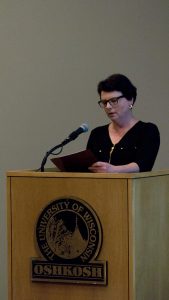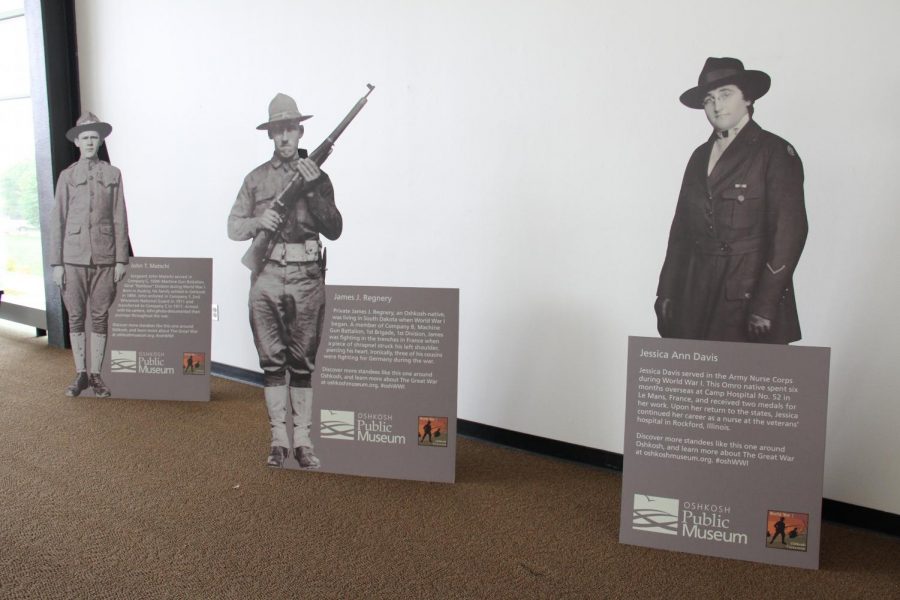UW Oshkosh remembers World War I events
Cutouts of Oshkosh residents during World War I are displayed on the third floor of Reeve Memorial Union.
October 4, 2018
A World War I centennial event takes place Oct. 2 through Oct. 4 at UW Oshkosh featuring faculty presentations, which examine the time period through many different lenses including art, culture, language and history, ranging from global to local perspectives.
According to CNN, this centennial event marks 100 years since the end of World War I, a war that pitted the victorious Allied Powers against the Central Powers in a four-year-long struggle resulting in an estimated 8.5 million casualties.
The United States entered the war in April of 1917 and brought an end to the war one year and six months later.
Oshkosh Public Museum Board member and history professor Gabriel Loiacono said the desire for such an event came from a museum board meeting.
The centennial is a partnership between the Oshkosh Public Museum and UWO with presentations taking place at the museum and on campus.

Monika Hohbein presents at a World War I event.
According to art historian and UWO professor Susan Maxwell, an event like this is worth commemorating.
“We remember this war for the major effect it had on society,” Maxwell said. “A lot of things happening today are the direct outcome of that war.”
Loiacono said various community members including professors and the mayor of Oshkosh expressed interest in supporting a centennial event to commemorate World War I.
“We wanted to get the University involved to showcase the expertise of various community members,” Loiacono said.
Loiacono said this expertise comes from a number of different fields, which is illustrated by the diversity of content the centennial offers.
“A lot of my colleagues know a lot about this period,” Loiacono said. “We have a few historians, an art historian, a musicologist, an art professor, a biologist and a couple of literature professors all talking about their different disciplinary perspectives.”
Biology professor Teri Shors is giving a presentation on the tragic influenza outbreak of 1918, the year the war ended. In 2001, Shors conducted a study to examine how a particularly deadly influenza strain in 1918 impacted Oshkosh.
“It was a horrible strain,” Shors said. “We’ve never seen anything like it before. It spread person to person really well.”
Shors said she was inspired to do the study after watching a PBS documentary on the 1918 influenza outbreak.
Shors said the study incorporated work from the biology, anthropology and psychology departments, all working to research how the flu of 1918 impacted Oshkosh from different disciplinary perspectives.
“I actually went to the courthouse and spent three days there just writing down the names of everyone that had died in Winnebago County,” Shors said.
Shors said she is convinced the 1918 influenza outbreak was a strong contributor to the end of World War I. Shors also said the flu hit Oshkosh in two waves and caused schools to close for two months.
“Can you imagine?” Shors said. “Oshkosh even had a curfew; bars would close at 5. It was like a ghost town.”
Maxwell is giving a presentation titled “Art from the Trenches: German Artists and World War I” to give an art history perspective to World War I.
Maxwell said she plans to cover artists in World War I to highlight the impact the war had on not only artists, but the culture of the time.
“War affects culture in really important ways,” Maxwell said. “It’s not just art or music or literature responding to the events but actually being changed by it.”
When looking at historical events through the arts, Maxwell said people can better understand the relationship between how art is both affected by history and how it shapes history.
“A quote that I am planning on using in my presentation reflects the relationship perfectly,” Maxwell said. “[Bertolt Brecht] said, ‘Art is not a mirror to reflect reality but a hammer with which to shape it.’”














